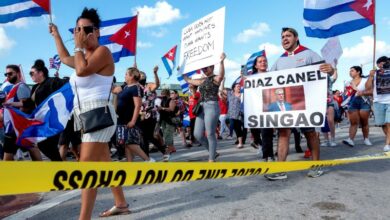Colombia’s Truth Commission pays tribute to conflict victims

By Irene Escudero
Bogota, Jun 29 (EFE).- Some of the more than 30,000 people who testified before Colombia’s Truth Commission were here Wednesday to celebrate the publication of the “genuine truth” about the decades-long, multisided conflict that claimed nearly half a million lives.
Coming a day after the formal release of the document in a solemn ceremony, Wednesday’s event featured music – from traditional regional rhythms to rap by ex-combatants.
“The Truth Commission has deeply felt your pain and has asked: why you?,” the panel’s chair, the Rev. Francisco de Roux, told people from all corners of the Andean nation gathered in the Plaza de los Artesanos.
It is thanks to those who shared their stories with the commission that Colombians have responded to the invitation to “make a different country,” the Jesuit priest said.
Only 20 percent of the roughly 470,000 fatalities documented in the report occurred in combat, he noted, adding: “all of the rest were people of civil society like you.”
The assembly was made up largely of Afro-Colombians, indigenous people and peasants, the communities who bore the brunt of the conflict.
Right-wing paramilitaries were responsible for 45 percent of the killings, according to the report, while the largest insurgency, the now-disbanded Revolutionary Armed Forces of Colombia (FARC), accounted for 21 percent.
Another 21 percent were attributed to police and the armed forces. Six percent of non-combatant deaths were blamed on the National Liberation Army (ELN) and other minor rebel groups.
One of those present for Wednesday’s event was Viviana Peñaranda, a member of a community organization in the Pacific port city of Buenaventura that provided the Truth Commission with information about instances that “exacerbated the racism toward Black women.”
“We have narrated, we have recounted … what is the genuine truth of the peoples who have suffered violence in Colombia,” she told Efe.
“Colombia,” she said, “needs to know what happened and needs to know it from the voices of the victims, not from historians.”
Nelson Ramirez, a former soldier who, like tens of thousands of Colombians, lost a limb in a land-mine explosion, said that while many in the army felt excluded from the peace process leading to the 2016 accord between the government and the FARC, he is satisfied that their voices have been heard by the Truth Commission.
“We have embraced those we thought were our enemies,” Isabela Vernaza said as candles were being lit on stage.
In an interview with Efe, De Roux said that one of the accounts he heard in his work with the commission was that of two sisters from the eastern province of Casanare who described how an army recruiter befriended their younger brother shortly before the sibling left “and did not return.”
A friend of the sisters told them their brother was probably dead and six months later, an older brother of the women disappeared with the involvement of the recruiter.
“They were false positives. They were taken, murdered, dressed up as guerrillas, presented as deaths in combat,” De Roux said, explaining that the brothers were among the more than 6,400 people killed by the military and falsely reported as fallen rebels.
But the memorable part of their story was what happened years later when they were face to face with the army recruiter who, the sisters said, had the “courage” to admit his responsibility for the deaths of their brothers. EFE
ime/dr





